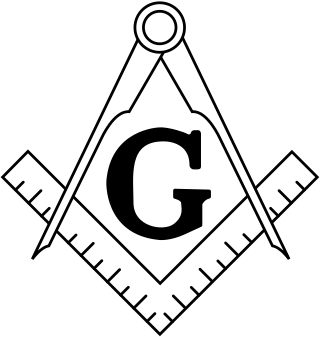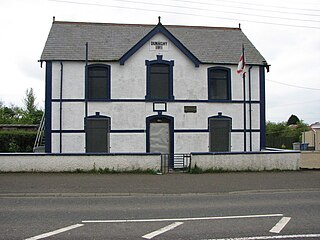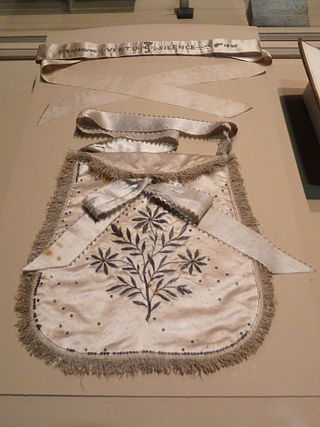
Freemasonry or Masonry refers to various fraternal organisations that trace their origins to the local guilds of stonemasons that, from the end of the 14th century, regulated the qualifications of stonemasons and their interaction with authorities and clients. Freemasonry is the oldest fraternity in the world and among the oldest continued organizations in history.

The Taxil hoax was an 1890s hoax of exposure by Léo Taxil, intended to mock not only Freemasonry but also the Catholic Church's opposition to it.

The Loyalist Volunteer Force (LVF) was an Ulster loyalist paramilitary group in Northern Ireland. It was formed by Billy Wright in 1996 when he and his unit split from the Ulster Volunteer Force (UVF) after breaking its ceasefire. Most of its members came from the UVF's Mid-Ulster Brigade, which Wright had commanded. In a two-year period from August 1996, the LVF waged a paramilitary campaign in opposition to Irish republicanism and the Northern Ireland peace process. During this time it killed at least 14 people in gun and bomb attacks, almost all of them Catholic civilians killed at random. The LVF called off its campaign in August 1998 and decommissioned some of its weapons, but in the early 2000s a loyalist feud led to several killings. Since then, the LVF has been largely inactive, but its members are believed to have been involved in rioting and organized crime. In 2015, the security forces stated that the LVF "exists only as a criminal group" in Mid-Ulster and Antrim.
The history of Freemasonry encompasses the origins, evolution and defining events of the fraternal organisation known as Freemasonry. It covers three phases. Firstly, the emergence of organised lodges of operative masons during the Middle Ages, then the admission of lay members as "accepted" or "speculative" masons, and finally the evolution of purely speculative lodges, and the emergence of Grand Lodges to govern them. The watershed in this process is generally taken to be the formation of the first Grand Lodge in London in 1717. The two difficulties facing historians are the paucity of written material, even down to the 19th century, and the misinformation generated by masons and non-masons alike from the earliest years.

The Independent Loyal Orange Institution is an offshoot of the Orange Institution, a Protestant fraternal organisation based in Northern Ireland. Initially pro-labour and supportive of tenant rights and land reform, over time it moved to a more conservative, unionist position.

The Twelfth is a primarily Ulster Protestant celebration held on 12 July. It began in the late 18th century in Ulster. It celebrates the Glorious Revolution (1688) and victory of Protestant King William of Orange over Catholic King James II at the Battle of the Boyne (1690), which ensured a Whig political party and Anglican Ascendancy in Ireland and the passing of the Penal Laws to disenfranchise and persecute the nation's Catholic majority, and to a lesser extent Protestant Dissenters, until Catholic Emancipation in 1829.
Prince Hall Freemasonry is a branch of North American Freemasonry created for African Americans founded by Prince Hall on September 29, 1784. Prince Hall Freemasonry is the oldest and largest predominantly African-American fraternity in the United States.
Anti-Masonry is "avowed opposition to Freemasonry", which has led to multiple forms of religious discrimination, violent persecution, and suppression in some countries as well as in various organized religions. However, there is no homogeneous anti-Masonic movement. Anti-Masonry consists of radically differing criticisms from frequently incompatible political institutions and organized religions that oppose each other, and are hostile to Freemasonry in some form.

The Peep o' Day Boys was an agrarian sectarian Protestant association in 18th-century Ireland. Originally noted as being an agrarian society around 1779–80, from 1785 it became the Protestant component of the sectarian conflict that emerged in County Armagh, their rivals being the Catholic Defenders. After the Battle of the Diamond in 1795, where an offshoot of the Peep o' Day Boys known as the Orange Boys defeated a force of Defenders, the Orange Order was instituted, and whilst repudiating the activities of the Peep o' Day Boys, they quickly superseded them. The Orange Order would blame the Peep o' Day Boys for "the Armagh outrages" that followed the battle.
The Defenders were a Catholic agrarian secret society in 18th-century Ireland, founded in County Armagh. Initially, they were formed as local defensive organisations opposed to the Protestant Peep o' Day Boys; however, by 1790 they had become a secret oath-bound fraternal society made up of lodges. By 1796, the Defenders had allied with the United Irishmen, and participated in the 1798 rebellion. By the 19th century, the organisation had developed into the Ribbonmen.
While many Christian denominations either allow or take no stance on their members joining Freemasonry, others discourage or prohibit their members from joining the fraternity.

The Loyal Orange Institution, commonly known as the Orange Order, is an international Protestant fraternal order based in Northern Ireland and primarily associated with Ulster Protestants. It also has lodges in England, Scotland, Wales and the Republic of Ireland, as well as in parts of the Commonwealth of Nations and the United States.

Protestant Irish Nationalists are adherents of Protestantism in Ireland who also support Irish nationalism. Protestants have played a large role in the development of Irish nationalism since the eighteenth century, despite most Irish nationalists historically being from the Irish Catholic majority, as well as most Irish Protestants usually tending toward unionism in Ireland. Protestant nationalists have consistently been influential supporters and leaders of various movements for the political independence of Ireland from Great Britain. Historically, these movements ranged from supporting the legislative independence of the Parliament of the Kingdom of Ireland, to a form of home rule within the United Kingdom of Great Britain and Ireland, to complete independence in an Irish Republic and a United Ireland.
The Battle of the Diamond was a planned confrontation between the Catholic Defenders and the Protestant Peep o' Day Boys that took place on 21 September 1795 near Loughgall, County Armagh, Ireland. The Peep o' Day Boys were the victors, killing some 6 Defenders, with some wounded Peep o day boys in return. It led to the foundation of the Orange Order and the onset of "the Armagh outrages".
The Royal Arch Purple, properly the Grand Royal Arch Purple Chapter of Ireland, is an organisation related to Orangeism but not recognised by the Grand Orange Lodge of Ireland which recognises only two degrees, those of Orange and Plain Purple. It is a necessary prerequisite for entry into the Royal Black Institution.

Freemasonry has had a complex relationship with women for centuries. A few women were involved in Freemasonry before the 18th century, despite de jure prohibitions in the Premier Grand Lodge of England.
The Loyal Orange Institution, better known as the Orange Order, is a Protestant fraternal order based in Northern Ireland. It has been a strong supporter of Irish unionism and has had close links with the Ulster Unionist Party, which governed Northern Ireland from 1922 to 1972. The Orange Order has lodges throughout Ireland, although it is strongest in the North. There are also branches throughout the Commonwealth, and in the United States. In the 20th century, the organisation went into sharp decline outside Northern Ireland and County Donegal. McGarry, John; O'Leary, Brendan (1995). Explaining Northern Ireland: Broken Images. Blackwell Publishers. p. 180. ISBN 978-0-631-18349-5.; The Orange marches</ref> The Order has a substantial fraternal and benevolent component.

The Drumcree conflict or Drumcree standoff is a dispute over yearly parades in the town of Portadown, Northern Ireland. The town is mainly Protestant and hosts numerous Protestant marches each summer, but has a significant Catholic minority. The Orange Order insists that it should be allowed to march its traditional route to and from Drumcree Church on the Sunday before the Twelfth of July. However, most of this route is through the mainly Catholic/Irish nationalist part of town. The residents, who see the march as sectarian, triumphalist and supremacist, have sought to ban it from their area.

Anti-Catholicism in the United Kingdom dates back to the martyrdom of Saint Alban in Roman times. Attacks on the Church from a Protestant angle mostly began with the English and Irish Reformations which were launched by King Henry VIII and the Scottish Reformation which was led by John Knox. Within England, the Act of Supremacy 1534 declared the English crown to be "the only supreme head on earth of the Church in England" in place of the Pope. Any act of allegiance to the latter was considered treasonous because the papacy claimed both spiritual and political power over its followers. Ireland was brought under direct English control starting in 1536 during the Tudor conquest of Ireland. The Scottish Reformation in 1560 abolished Catholic ecclesiastical structures and rendered Catholic practice illegal in Scotland. Today, anti-Catholicism remains present in the United Kingdom, particularly in Scotland and Northern Ireland.